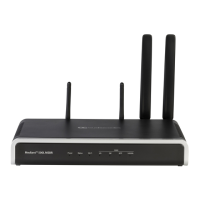User's Manual 67. Configuration Parameters Reference
Version 6.8 849 Mediant 500L MSBR
Parameter Description
Web: SIP Transport Type
EMS: Transport Type
CLI: app-sip-transport-type
[SIPTransportType]
Determines the default transport layer for outgoing SIP calls initiated
by the device.
[0] UDP (default)
[1] TCP
[2] TLS (SIPS)
Notes:
It's recommended to use TLS for communication with a SIP Proxy
and not for direct device-to-device communication.
For received calls (i.e., incoming), the device accepts all these
protocols.
The value of this parameter is also used by the SAS application
as the default transport layer for outgoing SIP calls.
Web: SIP UDP Local Port
EMS: Local SIP Port
CLI: sip-udp-local-port
[LocalSIPPort]
Defines the local UDP port for SIP messages.
The valid range is 1 to 65534. The default is 5060.
Web: SIP TCP Local Port
EMS: TCP Local SIP Port
CLI: sip-tcp-local-port
[TCPLocalSIPPort]
Defines the local TCP port for SIP messages.
The valid range is 1 to 65535. The default is 5060.
Web: SIP TLS Local Port
EMS: TLS Local SIP Port
CLI: sip-tls-local-port
[TLSLocalSIPPort]
Defines the local TLS port for SIP messages.
The valid range is 1 to 65535. The default is 5061.
Note: The value of this parameter must be different from the value of
the parameter TCPLocalSIPPort.
Web: Display Default SIP Port
CLI: display-default-sip-port
[DisplayDefaultSIPPort]
Enables the device to add the default SIP port 5060 (UDP/TCP) or
5061 (TLS) to outgoing messages that are received without a port.
This condition also applies to manipulated messages where the
resulting message has no port number. The device adds the default
port number to the following SIP headers: Request-Uri, To, From, P-
Asserted-Identity, P-Preferred-Identity, and P-Called-Party-ID. If the
message is received with a port number other than the default, for
example, 5070, the port number is not changed.
An example of a SIP From header with the default port is shown
below:
From:
<sip:+4000@10.8.4.105:5060;user=phone>;tag=f25419
a96a;epid=009FAB8F3E
[0] Disable (default)
Enable
Web/EMS: Enable SIPS
CLI: enable-sips
[EnableSIPS]
Enables secured SIP (SIPS URI) connections over multiple hops.
[0] Disable (default)
[1] Enable
When the SIPTransportType parameter is set to 2 (i.e., TLS) and the
parameter EnableSIPS is disabled, TLS is used for the next network
hop only. When the parameter SIPTransportType is set to 2 or 1
(i.e., TCP or TLS) and EnableSIPS is enabled, TLS is used through
the entire connection (over multiple hops).
Note: If this parameter is enabled and the parameter
SIPTransportType is set to 0 (i.e., UDP), the connection fails.

